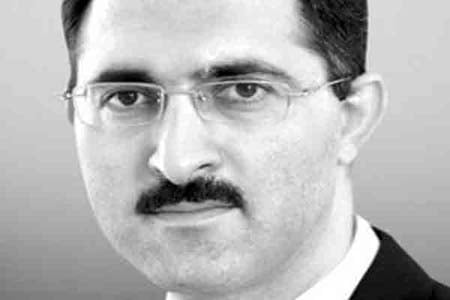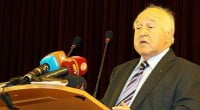Saving the soul of Turkey [amid the graft probe]

Date posted: December 27, 2013
ABDULLAH BOZKURT
Perhaps Turkey’s embattled Prime Minister Recep Tayyip Erdoğan has already lost the battle against the judiciary over massive corruption investigations involving senior members of his ruling Justice and Development Party (AKP), businessmen close to him and even his relatives. He just does not know it yet as it will probably take some time for the bitter facts to sink in.
The nation’s prosecutors are not stupid enough to go after the country’s most powerful people without having solid evidence that can hold up to scrutiny in a court of law. It seems that even the few pieces of evidence that have leaked to the press amid the government’s relentless efforts to suppress them have easily convinced the Turkish public of the massive wrongdoings in the upper echelons of the government. In people’s minds, the Erdoğan government is already guilty and there is no appeal, which will in turn lead to the collapse of his “comeback kid” strategy and his efforts to survive through elections.
The prosecutors are also not incompetent people who disregard judicial procedures to the extent that their case might be thrown out of court. All the talking points whispered by Erdoğan’s men into the public’s ears have failed. For example, the government argued that he should have been let into the investigation in advance. It turns out the laws prohibit prosecutors from notifying the government, which is in line with the rule of separation of powers between the two branches. Erdoğan rushed overnight to change the rules of engagement through an executive order, which triggered a series of legal challenges on the grounds of legality and constitutionality.
The deadliest blow to the government came from Turkey’s top judicial body, the Supreme Board of Judges and Prosecutors (HSYK), which came out very strongly against the government interference with an ultimatum-like statement condemning this executive order and the pressures imposed on the judiciary. The fact that the judicial council stood behind prosecutor Muammer Akkaş, who was removed from an investigation involving a corruption scheme worth $100 billion, is testament to the fact that there is no violation of rules and procedures, unlike chief prosecutor Turan Çolakkadı, whom the opposition accuses of being a spokesperson for the government. I suppose the Council of Europe’s (CoE) Venice Commission, which endorsed changes to the HSYK in 2010 and has a big stake in Turkey’s judicial woes, must be very happy to see that the judicial council is actually taking a very principled stand against the government’s interference in the judiciary.
For the first time, we are seeing the executive branch in this country blatantly disregarding the letter and spirit of the law and meddling in judicial investigations openly and flagrantly. Erdoğan’s mishandling of the corruption cases by unnecessarily dragging his feet on the resignations of four ministers who were implicated in the graft for a week before yielding has turned what was a judicial case into a government crisis. Now Erdoğan, by inventing imaginary enemies at home and abroad to shift the blame and justify his meddlesome tactics in the judiciary, has escalated the government crisis into a state crisis where the executive is trying to usurp the powers of the judiciary as well.
On the sidelines, President Abdullah Gül, as if he is the head of state of Mars, has simply been watching to see how this crisis will unfold before making any decisive moves. He even waited for a week since Dec. 17, when the country’s biggest corruption probe was made public, to comment on the investigation. Even then, he did not say much, seeking refuge in the principles of the rule of the law, the separation of powers and democratic ideals. Gül, who has always avoided taking risks in his long political career, is holding his fingers up in the air to try to feel where the wind is blowing before taking a clear stand on Turkey’s major state crisis. In the meantime, however, he is not stopping Erdoğan from dismissing senior officials to replace with loyalists by putting his signature of approval on decrees. If he resisted, for example, appointing a former spy as the head of the Telecommunications Directorate (TİB), which is Turkey’s listening post charged with complying with court orders on wiretapping suspects’ phones, Erdoğan would have not succeeded in turning the state into a major intelligence machine.
It is simply unacceptable for Gül not to come out and put a stop to the government interference in the judiciary when even Turkey’s allies and friends, worried over the government’s attempts to cover up corruption, have been suggesting that Turkey not derail the investigations and act in line with legal and democratic principles. Well, I guess these are testing times for everyone. İdris Naim Şahin, who has been with Erdoğan for almost 30 years and served as secretary-general of the AKP and interior minister for the government, taught everyone a lesson by resigning from the party and issuing a manifesto-like statement accusing Erdoğan of running the country with a small gang of people whose intentions are questionable. He is now being targeted with character assassination by the same gang he was blaming for steering the country in the wrong direction.
The stakes in Turkey are quite high. Three fundamental principles are at great risk right now with the way Erdoğan is handing government affairs: democracy, fundamental rights and the rule of law, all key determinants of whether Turkey has a role to play in global affairs as a responsible actor. For one, Erdoğan sees democracy as merely a short trip to the ballot box where people cast their votes every four years. He sees the ballot box as the ultimate arbitrator in deciding everything, even settling the claims in the massive corruption investigations, which have to be sorted out in a court of law. He has repeatedly made all these arguments publicly in rallies and even dared business communities, the media and civic groups, critical of his government on some issues, to challenge him in the elections by forming political parties.
In terms of fundamental rights, Erdoğan does not tolerate any dissent or critical media at all. He publicly bashes reporters, labeling them traitors or foreign agents just because these members of the press corps are exercising their right to freedom of expression. When business advocacy groups expressed their concerns over problems that might affect their investments or trade, he started name-calling, labeling them domestic collaborators for international conspiracy groups that want to harm Turkish national interests. Civic groups like Hizmet are unable to avoid his wrath as well and are easily accused of running “parallel structures” or “gangs” within the state apparatus with no shred of evidence to back these claims.
The last, but not least, blow unfortunately to the rule of the law in this country came under Erdoğan’s watch. An independent and impartial judiciary is critical in Turkey to deliver justice and ensure transparency and accountability in governance. Unfortunately, Erdoğan is trying to turn the judiciary into a submissive state agency that does his bidding just like he has done with Parliament with his domination of the AKP. For all intents and purposes, he is seeking an ultimate consolidation of power and does not care much about separation of power. The judicial council’s outcry on Thursday over the government’s interference is testament to that bitter fact. In a veiled criticism of the government, even the military came out strongly on Friday, saying it respects the rule of law in Turkey and abides by the rules even when military personnel are involved in judicial investigations.
If Erdoğan has his way, Turkey, to be cast in his own image, will be no longer be interested in membership in the European Union but will also dump the CoE, of which it was one of the founding members. It will likely withdraw its signature from the European Convention on Human Rights (ECHR) and will no longer accept judgments by the European Court of Human Rights (ECtHR), which are currently binding on Turkey. Turkey’s transatlantic strategic partnership is also at risk, with Erdoğan making new overtures to solidify ties with newfound partners in the East and alienating decades-long alliance members for no justifiable reason whatsoever.
The question boils down to whether Erdoğan can actually turn the clock back in Turkey’s democratic journey. Hardly, given the transformation that has been taking place in Turkish society over the past several decades. He may perhaps postpone the day of reckoning by exerting pressure on the judiciary and skewing the checks and balances in the state system in his favor, but he cannot avoid being eventually dragged under public scrutiny to give his account on the massive corruption in the government. Ultimately the buck stops with him. His government will eventually be caught with what seems to be serious claims based on overwhelming evidence, and Erdoğan will have to respond to the charges.
I think Erdoğan did a great disservice to his fellow comrades in the ruling AKP by resisting and trying to thwart the judicial probe, which was perhaps the only avenue to put this scandal behind him. He blocked the only way to clear himself and the party in the eyes of the people. As details of these massive corruption scandals will reverberate across coffeehouses, town hall meetings and family gatherings in each and every corner of Turkey, all AKP politicians conducting campaign tours for the elections will be looked at suspiciously or even as potential culprits involved in corruption. The AKP cannot simply carry that burden as we have already seen a flurry of defections and resignations from the party in protest of Erdoğan’s mismanagement of the corruption probe.
Erdoğan has accused pretty much everyone in this country of treachery, from the media and businesses to intellectuals and civic groups. But in fact, it seems that it was he who betrayed his friends, party, government and country.
Source: Today's Zaman , December 27, 2013
























